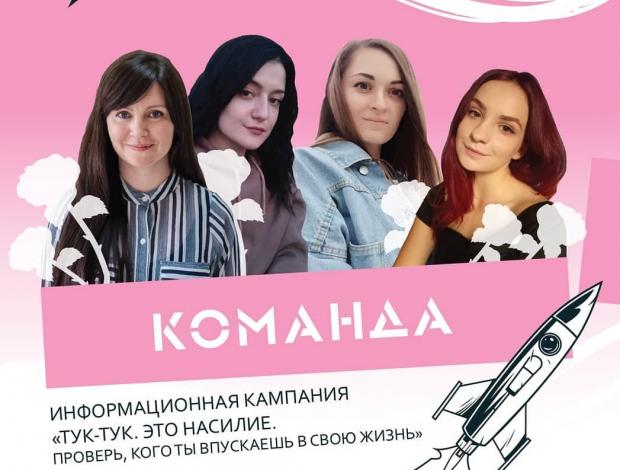Civil society: Building trust and peace during the COVID-19 pandemic
During the COVID-19 pandemic, hidden behind the closed doors of the lockdown domestic violence has increased. For a domestic abuse victim support organization like Vialex, reaching and helping vulnerable people during these unprecedented times has required a new strategy, which has come in the form of an OSCE mentorship programme.
“The pandemic and related restrictions have made it difficult to assist vulnerable women in person,” said Olga Purakhina, Director of Vialex. “So we applied for an advocacy mentorship to adjust our strategy to a new reality.”
Vialex, established six years ago in the left-bank town of Ribnita in Transdniestria, is one of 17 newly established civil society organizations (CSOs) that took part in an OSCE-supported mentorship programme in Transdniestria in 2020. Civic work remains a challenge on the left bank of the Dniester/Nistru River, where many CSOs are new and require support in institutional development, strategic planning and financial sustainability.
The programme uses experienced mentors who provide tailored assistance to organizations dealing with structural and organizational problems over the course of a few months. A follow-up consultation takes place the next year.
Working closely with their mentor, Vialex developed an Instagram-based awareness-raising campaign: ‘Knock Knock, It’s Violence’.
“Without using frightening images, our online campaign explained to a young audience how to recognize abuse and build healthy relationships,” said Purakhina. “This was our first online project, and it turned out to be successful thanks to the hands-on, professional advice from our mentor. The mentorship programme was very timely and inspiring.”

This was the second time Vialex participated in the mentorship programme. The first was in 2018.
“We were only two-and-a-half years old and needed an honest assessment of our achievements and failures. With advice and help from our mentor, we improved our decision-making processes, our internal and external communication, planning, and fundraising practices,” Purakhina said. “This positive experience is what encouraged us to apply again after the pandemic hit.”
Twenty-eight civil society organizations have taken part in the mentorship programme since its launch in 2017.
Expanding networks
While the mentorship programme provides useful guidance, networking with peers and donors is essential for civil society organizations to discover new opportunities. Each year civil society organizations from both banks come together for the annual Donors Forum, hosted by the OSCE Mission, to strengthen their professional networks.
“This forum is unique in terms of format and importance, especially for organizations from Transdniestria. It is an opportunity to contact donors directly and speak about our achievements and problems,” said Purakhina.
This forum is unique in terms of format and importance, especially for organizations from Transdniestria. It is an opportunity to contact donors directly and speak about our achievements and problems.
Olga Purakhina Director of Vialex
Restrictions due to the COVID-19 pandemic meant the 2020 Forum was organized online. Over 100 participants took part and shared their experiences during the pandemic and ways they adjusted to the challenges it has created.
“The Donors Forum is a great opportunity for us to exchange views with likeminded partners and beneficiaries working on the resolution of the Transdniestrian conflict. The UK currently works primarily in the fields of domestic violence prevention and economic integration in Transdniestria, and events like the Donors Forum allow us to share our experiences and learn from others working on similar projects,” said Chris Perkins, Head of Programmes at the British Embassy in Chisinau. “I also highly value the OSCE’s NGO Catalogue, an initiative of the Donors Forum, as a source of information when looking to increase my knowledge about the activities of civil society in Moldova.”
Last year’s Forum helped four CSOs secure funding from donors. Feedback from the remaining majority of CSOs noted that the Forum helped them understand better priorities of donor organizations.
Building bridges of trust
The Donors Forum and mentorship programme help bridge gaps between partners on both sides of the river. Bringing civil society workers closer together in addressing shared priority issues is one of the confidence-building measures under the Transdniestrian settlement process mediated by the OSCE Mission to Moldova.
“This exchange of experiences between civil society organizations on both banks facilitates communication and deepens trust across the river,” said Ludmila Samoila, National Programme Officer of the OSCE Mission to Moldova. “By empowering civil society organizations, we also promote greater respect for human rights which are a cornerstone for lasting peace and security.”
Supporting civil society organizations plays a dual-purpose in the context of the Transdniestrian settlement process. It helps the organizations grow and develop, enabling them to provide better services to their communities. It is also an important confidence-building tool, as it creates opportunities for co-operation between people on both banks of the Dniester/Nistru River.
Civil society organizations are important partners in the OSCE’s work. They play a vital role in the promotion of peaceful societies based on rule of law and respect for human rights. They also contribute to dialogue and mediation efforts related to conflict prevention, crisis management and post-conflict rehabilitation. Enhancing the capacity of civil society organizations through initiatives like the mentorship programme and donors forum is an important part of the OSCE’s work to strengthen security and build trust throughout the OSCE region.

